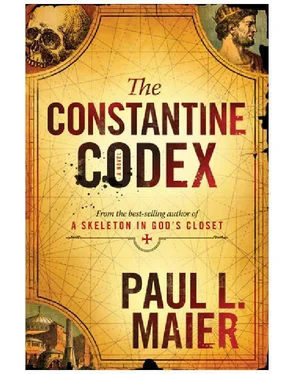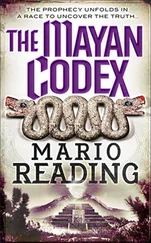Paul Maier - The Constantine Codex
Здесь есть возможность читать онлайн «Paul Maier - The Constantine Codex» весь текст электронной книги совершенно бесплатно (целиком полную версию без сокращений). В некоторых случаях можно слушать аудио, скачать через торрент в формате fb2 и присутствует краткое содержание. Жанр: Триллер, на английском языке. Описание произведения, (предисловие) а так же отзывы посетителей доступны на портале библиотеки ЛибКат.
- Название:The Constantine Codex
- Автор:
- Жанр:
- Год:неизвестен
- ISBN:нет данных
- Рейтинг книги:5 / 5. Голосов: 1
-
Избранное:Добавить в избранное
- Отзывы:
-
Ваша оценка:
- 100
- 1
- 2
- 3
- 4
- 5
The Constantine Codex: краткое содержание, описание и аннотация
Предлагаем к чтению аннотацию, описание, краткое содержание или предисловие (зависит от того, что написал сам автор книги «The Constantine Codex»). Если вы не нашли необходимую информацию о книге — напишите в комментариях, мы постараемся отыскать её.
The Constantine Codex — читать онлайн бесплатно полную книгу (весь текст) целиком
Ниже представлен текст книги, разбитый по страницам. Система сохранения места последней прочитанной страницы, позволяет с удобством читать онлайн бесплатно книгу «The Constantine Codex», без необходимости каждый раз заново искать на чём Вы остановились. Поставьте закладку, и сможете в любой момент перейти на страницу, на которой закончили чтение.
Интервал:
Закладка:
Finally Abbas responded, “I must prefer the true and final revelation of God himself in the Holy Qur’an against that of human beings, whether they wrote as eyewitnesses or were removed even thousands of years from what they reported.”
Jon waited out the inevitable applause from the Muslim half of the audience, then replied, “I respect you for your faith, worthy Imam.” He suppressed what he wanted to add: even though no historian in the world would agree with you. What he did add was: “And I trust that you will respect mine.”
The moderators rang a bell, indicating that it was time for the midafternoon break. Both sides of the sanctuary offered applause, clearly enthusiastic enough to exceed what was merely routine or polite.
Jon’s luncheon group, along with their detail from the Turkish police and the CIA, retired to what would have been the green room in any other public venue, but at Hagia Sophia it had to be a robing room in the apse of the basilica. More than anything else, Jon wanted to hear Osman al-Ghazali’s reaction to the afternoon debate, thus far. As a convert from Islam, his opinions were of utmost importance.
“Brilliant defense of the faith, Jon,” he opened. “And you really scored some potent points against Islam. By the way, it seems that most of the national television networks in the Muslim countries are making use of Al Jazeera’s feed from their big camera crew in the east balcony.”
“Great. But why are you frowning?”
“Oh, was it that noticeable? Well, I’m… just a little concerned…” His voice trailed off.
“Concerned about…?”
“Well, during the debate, I’ve been watching the other side very carefully, particularly several of their well-known mullahs whom I recognized, sitting near the front. Some Shiites were there too. One, in fact, was Ayatollah al-Kazim from Tehran, not the one who laid a fatwa on your head, but his lieutenant. And then there was Imam Chasbullah, who evidently came all the way from Indonesia, Amir Ahmad Riza Khan from Pakistan too. Among the Sunnis there were several princes from the royal family in Saudi Arabia, as well as a big Egyptian delegation-mainly faculty colleagues of al-Rashid. But I digress. My concern is this: every time you scored a debating point against Islam, I watched their reaction. We’re talking narrowing of the eyes, clenching fists, and corrugated foreheads. Lots of frowning, too.”
“You mean they weren’t exactly applauding me?” Jon quipped with a wink to Shannon that was intended to forestall any worry on her part.
“Well, put it this way: I wouldn’t want to break bread with any of them afterward.”
“Hadn’t really planned to, Osman.” Jon looked up. “Uh-oh, here comes Ferris with that cell phone molded to his left ear.”
“Hi, team,” he said. “Our debate’s been on for an hour now in the States. It’s replacing the morning shows on NBC and CBS, with ABC cutting in from time to time on Good Morning America. CNN is covering everything from gavel to gavel, but with a commentary team that’s half-Christian and half-Muslim.”
“Excellent!” Jon said. “I’ll bet watching that would be more fun than the actual debate!”
“Yeah, but-” Ferris’s face fell a bit-“the NBC studios at Rockefeller Center received a bomb threat from someone who called in with a Middle Eastern accent.”
Shannon bit her lip and glanced at Jon with a look that all but shouted, I knew something like this would happen!
“What are they doing about it?” Osman wondered.
“Well, they have to take it seriously, of course,” Ferris replied, “but that sort of thing is quite routine nowadays, unfortunately.”
“We have to go back shortly,” Jon said. “Any further advice, Osman?”
“Just beware of any traps that al-Rashid may try to set for you. If you’re caught in one, he could win the debate. I’d only suggest that you continue walking that tightrope, Jon. You have to defend the faith, of course, but try to do it as diplomatically as you can-”
“Without enraging the other side. Got it, Osman.” Blasted restraint, he almost muttered. How I’d love to cut loose!
On the way back to the dais, Jon weighed the obvious. They were now on the last lap. What if he got tired-or impatient-and let his guard down? One ill-chosen phrase, evidently, could ignite the Islamic world. Again that dreadful double standard: Curse Christ as much as you wish in the West, or draw caricatures of his church, or place a crucifix in a pan of urine and call it art (duly funded by the government), and you easily get away with it. Try the same with Islam or Muhammad and you’re dead!
Just before stepping onto the dais, Jon looked at row ten on the Christian side of the sanctuary, because it seemed to be filled with Roman collars. And on the aisle, whom should he see but the wonderfully familiar face of Kevin F. X. Sullivan, “my personal ambassador to the Vatican,” Jon often told friends. He immediately walked over, and they exchanged several slaps on the back.
“And what brings you to Istanbul, Kev?” Jon asked. “Converting to Eastern Orthodoxy, are you?”
“Right! But only when you return to Mother Church, Jon. The Holy Father sends you his blessings.”
“And mine to him, Kev. Gotta run. What’re you doing for dinner?”
“No special plans.”
“Great! We’re at the Hilton. Say 7 p.m.?”
Before Kevin could answer, Jon had to return to the dais. But he looked back and saw his friend flashing a thumbs-up sign.
The moderators now announced that the same, freewheeling dialogue would govern the final session of the debate, with a minimum of their interference. Applause actually broke out at that point, which both the patriarch and the primate took graciously.
“I have a question for you, Professor Weber,” Abbas al-Rashid began. “What in Islam do you find the most difficult doctrine to accept?”
Clever, Jon thought. Makes Abbas look like he’s ready for anything, while luring me out on a dangerous limb. Why didn’t I think of that one first? Jon finally opened his mouth and said, “The doctrine of abrogation.”
Abbas looked puzzled. “The doctrine of abrogation?”
“Yes, the idea that God could lay down one precept and then-in what is claimed as a subsequent revelation-change his mind and say something entirely different. I find that demeaning to God’s perfection.”
“But the later command is an improvement on the previous one, as Allah tells us. Isn’t that gracious of the Divine Majesty?”
At that point, Jon had to bite his tongue, for he wanted to say, Well, why didn’t the deity get it right the first time? Didn’t he have a second cup of coffee that day? What he actually said was “One only wonders why anything that God did or said would need improvement.” This was met with applause from the Christian contingent. Then he added, in tit for tat, “And what in Christianity do you find the most difficult doctrine to accept, esteemed Imam?”
“Two claims, really,” he replied. “The Trinity, of course, is still incomprehensible to any Muslim. But the other is what you Christians call the doctrine of the Incarnation, that the God of the universe could have taken on human flesh in Jesus. That is impossible by any standards and is far more demeaning to God than the idea of God improving on his commands.”
“Well said! And I certainly agree that the Trinity and the Incarnation are the two greatest mysteries, the two greatest miracles of the Christian faith. Again, though, I side with Augustine who said, ‘I believe because it is absurd’-absurd to human logic, to be sure, but our minds are so dimensionally different from that of God that what seems absurd to us may be entirely logical in the divine dimension. And what greater revelation could God give us than to cross the cosmic divide into humanity, forming the divine bridge by which we can truly know God and experience the blessings of having our sins forgiven by faith in the suffering, death, and resurrection of Jesus Christ?”
Читать дальшеИнтервал:
Закладка:
Похожие книги на «The Constantine Codex»
Представляем Вашему вниманию похожие книги на «The Constantine Codex» списком для выбора. Мы отобрали схожую по названию и смыслу литературу в надежде предоставить читателям больше вариантов отыскать новые, интересные, ещё непрочитанные произведения.
Обсуждение, отзывы о книге «The Constantine Codex» и просто собственные мнения читателей. Оставьте ваши комментарии, напишите, что Вы думаете о произведении, его смысле или главных героях. Укажите что конкретно понравилось, а что нет, и почему Вы так считаете.












